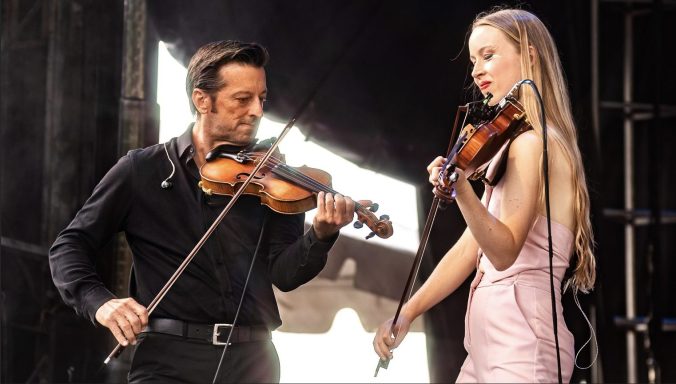String Bands: Bluegrass and Beyond
A Curmudgeon Column
Photo by J. Strausser, courtesy of IVPR
DelFest, the annual event hosted by Del McCoury, is often described as a bluegrass festival, even though only a minority of the acts are traditional bluegrass bands. Many a casual observer assumes that any band dominated by banjo, fiddle, acoustic guitar, acoustic bass, dobro, mandolin and/or fiddle is a bluegrass act. But these instruments were wielded effectively before Bill Monroe invented bluegrass, and they’ve been used skillfully in many styles since his death in 1996.
It would be more accurate to describe DelFest as a string-band festival, one that, this year, included not only hard-core bluegrass act such as the Junior Sisk Band but also jam-bands such as Trampled by Turtles, honky-tonk singers such as Sierra Ferrell, old-time acts such as Price Sisters and folkie singer-songwriters such as Peter Rowan. The term “string-band” provides a larger umbrella that all of these acts can fit under—and a number of recent records demonstrate the diverse uses these wooden, stringed instruments can be put to.
One of the highlights of this year’s DelFest was the group led by Jason Carter, the much awarded fiddler in the Del McCoury Band. But this year, his second solo album, Lowdown Hoedown, revealed that Carter is also an impressive singer—as good a baritone as his bandmate Ronnie McCoury is a tenor. It’s not just that Carter can hit the notes; he knows how to tell a story, especially when a song is as evocative as John Hartford’s “The Six O Clock Train and a Girl with Green Eyes” or Shawn Camp’s “The Queen of the Nashville Night.”
-

-

-

-

-

-

-

-

-

-

-

-

-

-

-

-

-

-

-

-

-

-

-

-

-

-

-

-

-

-

-

-

-

-

-

-

-

-

-

-








































